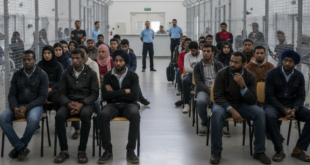A growing number of migrants living in Germany are contemplating leaving the country due to political dissatisfaction, high taxes, excessive bureaucracy and personal preferences. This is the key finding of a new study by the Institute for Employment Research (IAB), which raises concerns about the long-term retention of skilled foreign workers vital to Germany’s labour market.
The study, published recently, reveals that although 57% of migrants intend to stay permanently in Germany, over a quarter (26%) have thought about leaving within the past year. Another 12% stated they were in Germany only temporarily, while 3% already have concrete plans to return to their countries of origin or move elsewhere. A further 13% remain undecided about their future in the country.
The large-scale study surveyed 50,000 people aged 18 to 65, all of whom were born outside Germany but now live in the country. Among the reasons cited for emigration considerations were political frustrations, dissatisfaction with Germany’s tax system and the burden of bureaucratic processes. According to IAB researcher Yuliya Kosyakova, these findings suggest that government reforms such as reducing administrative hurdles and lowering tax burdens could help improve migrant retention.
Beyond economic and political factors, social inclusion plays a critical role. Fellow IAB researcher Katia Gallegos Torres emphasized that a sense of belonging, emotional connection to Germany and fewer experiences of discrimination are significant in reducing the likelihood of migrants considering leaving.
In response to the study, the Federal Government’s Commissioner for Integration, Reem Alabali-Radovan, called the findings “a wake-up call” and urged for a renewed focus on creating a welcoming environment. “We must ensure that every person who chooses Germany as their new home feels valued and supported – socially, economically and emotionally,” she said.
Civil society actors echoed this sentiment. Tareq Alaows of the refugee advocacy group Pro Asyl stressed that discriminatory experiences, especially among refugees, contribute to a sense of alienation. “We cannot expect people to stay where they don’t feel safe or respected,” he said, calling for stronger anti-discrimination policies and more inclusive public discourse.
Meanwhile, several MPs from the Green and SPD parties have pointed to the need for concrete policy reforms. Green MP Filiz Polat said that cutting red tape and easing access to public services and employment are essential to long-term integration. “Integration isn’t just about employment statistics — it’s about people’s lived realities,” she noted.
As Germany intensifies recruitment efforts abroad, this report sends a clear message: attracting talent is only half the job, creating an inclusive environment where people feel welcome and valued is essential to keeping them.
Adira Kallo
 THE AFRICAN COURIER. Reporting Africa and its Diaspora! The African Courier is an international magazine published in Germany to report on Africa and the Diaspora African experience. The first issue of the bimonthly magazine appeared on the newsstands on 15 February 1998. The African Courier is a communication forum for European-African political, economic and cultural exchanges, and a voice for Africa in Europe.
THE AFRICAN COURIER. Reporting Africa and its Diaspora! The African Courier is an international magazine published in Germany to report on Africa and the Diaspora African experience. The first issue of the bimonthly magazine appeared on the newsstands on 15 February 1998. The African Courier is a communication forum for European-African political, economic and cultural exchanges, and a voice for Africa in Europe.



































